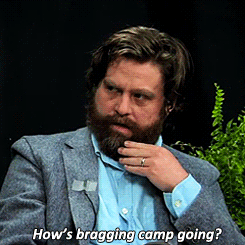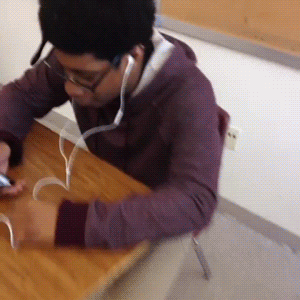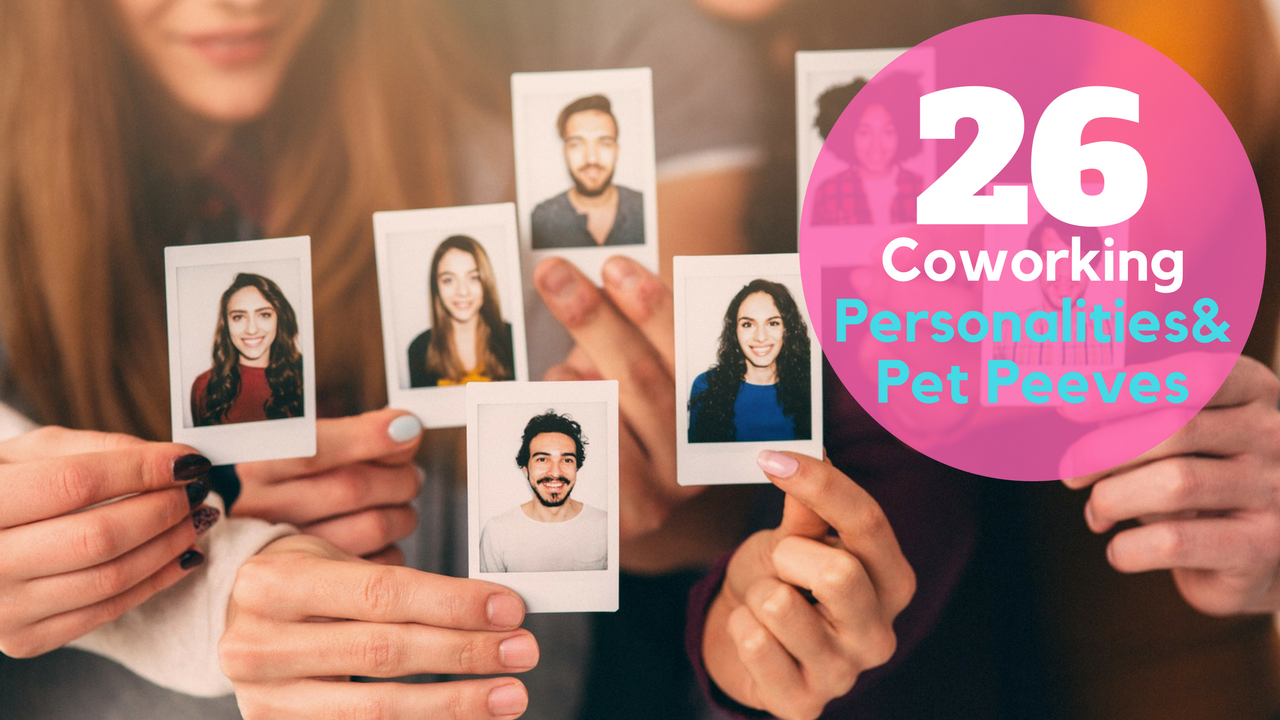- Digital nomad Robert Kropp takes a lighthearted look at the 26 types of coworkers he has shared space with.
- There are a tremendous amount of coworkers that work, act, talk, and live in many different and intriguing ways.
- Do you identify with any of these personalities? Robert offers advice on how it feels to be on the receiving end, and how to be a better coworking neighbor.
Throughout my digital nomad journey exploring coworking spaces around the world, I have met and worked next to a tremendous number of coworkers that work, act, talk, and live differently.
Here is my list of the types of coworkers I’ve shared space with along the way.
This list is far from exhaustive but it’s a starting point based on what I have observed over the past few years. Do you have any other types of coworkers to add? Tell me about it.
Personalities & Pet Peeves
1. I Have a Quick Question
Have you ever met someone that comes up to a person, asks for a quick question and then chats for half an hour? I have. Sometimes, I am even this type of person.
These people need boundaries and need to understand that this is acceptable from time to time but making it a habit will affect coworkers around you and how they interact with others.
2. Can You Help Me with This?
There are plenty of times we all need help; however, this person often asks for too much. They are either unwilling to make a simple Google search or spend the time to learn something before asking such general questions as, ‘Can you fix this for me?’ or ‘What do I do?’
Save your time and everyone else’s by choosing specific moments to ask for help. Self-reliance is a wonderful tool and sometimes digging to find an answer makes you better able to help yourself or someone else in the future.
3. Look at Me!

Whether a new project was started, a startup raised money, or the dream of what is to come is high, there are many people in the space that not only want to share what they are doing but want to bring it up constantly to anyone that will listen. I have done it.
When talking about all of these great things, please just be aware that you might be overdoing it and annoying others. You also don’t know if the people around you could be having very different experiences at the time.
Don’t underestimate the importance of spending a moment to listen to someone else.
4. The Sky is Falling
There are two types of people in negative circumstances.
The first type is actually having a horrible moment in their life. In that case, please listen and help if you can. The support system and group of friends in my coworking space arguably saved my life and allowed me to be where I am today.
On the other hand, there are plenty of people that want to just talk about how bad things are going and not be willing to make a change or do something about it. For me, I do my best to protect my emotional state. Negative people like this bring me down and I will only listen to it for a little while. If you are a negative person like this, please be aware of it and pay attention to when it is happening. A lot of these negative feelings can be overcome when you notice that it is happening, as it does affect the people around you.
5. How Do I Make Money?
Many people come into a coworking space with the dream of earning a living while working on their own. Among the questions that come up all too often are, How should I make money? What should I do? What business should I start?
Instead of asking these questions and waiting for someone to give you the silver bullet to life and business, just try some things out. Do some things for free. Build a portfolio. Work under someone for a little while. See what it takes.
These types of questions are usually not terribly productive. These could be a starting point but, in my experience, those that are asking these questions need to just start on an idea or go work with someone else. I have personally had the experience of needing to learn some hard lessons over about a year and a half that ultimately meant a closure of a company that I should have closed much earlier. Don’t live in the dream. Taking action and adjusting as you learn new things can be one of your most important attributes.
6. Buy From Me!

Whether it is marketing services or a new software tool, some people in a space will be quite direct when trying to gain new business. Instead of networking and building relationships over the long run, there is a portion of people that are just there to sell.
Be aware of this and don’t feel bad saying no. For a manager or owner of a space, it is important to be aware when this happens and monitor the situation.
7. I’m Right
Whether in a workplace, home, or out in the world, there are people that just have to be right. They ‘are’ right or believe so and their opinion is the only thing that matters. Whether they are a part of your team or another coworker in the space, these people can be helpful if they do have a breadth of knowledge but also can be detrimental because they are not able to consider ideas outside of their own.
Be careful with their advice and understand that some conversations don’t have a solution. They just need to end.
8. The Experts
Is there someone in the space that is much better than the rest in regards to marketing, programming, business decisions, selling, etc? They exist in almost every space and can often be the busiest and most interrupted with questions. I have seen a few people that stopped going to a space as much because they couldn’t get any work done due to the number of people coming up to ask questions.
For community managers or owners, be sure to create an environment where people respect boundaries and that there is a time for questions or chatting and there is a time for work. Be respectful to this group as they can provide a tremendous value to the space in terms of talent but also for the community as a whole to continue to grow together.
9. The Cool People
Some people are just fun. Enough said. Just make sure you don’t spend all day talking. Get some work done.
10. Stuck on Headphones

There are people that just want to show up and plug in all day. You might not know who they are but they always have headphones on, which limits the willingness or ability to say hello and interact. I have experienced too often that headphones are not great for improving the vibe of a space. They immediately separate a person from others.
The best solution I have found is to only put them on during a call or short stints during the day so that people know when they should or shouldn’t come up to me.
11. The Loud Coworker
First off, some people become the loud coworker if they take phone calls with both earbuds in during a call. With two earbuds in at once, a person is much less likely to talk quietly.
On the other hand, some people are just loud. Pay attention to how loud you are being and just be reasonable. For those people who don’t know or don’t care that they are being overly loud, the space managers or coworkers should come up and request a change. These workspaces are shared, so be a good neighbor.
12. Missing a Food Clip
If there is food available at the space, this person just can’t seem to clean up after themselves or do something as simple as closing a bag of chips.
Not everyone will be clean in a space, which is why it is important to be consistent and stay on top of the mess. If a kitchen or space starts to become too messy from lack of care by the coworkers, the owner or manager must work with the members of the space to determine a direction for improvement and change.
13. The Last Cup
If the coworkers are responsible for keeping up with making coffee, it is inevitable that you will go to pour a cup of coffee and the carafe will be empty. This is always a sad moment.
There are usually a few people in the space or visitors that just never make coffee. Either they don’t care, don’t pay attention, or don’t know how. Make signs and keep working with the community to make it normal behavior to be better stewards of the space and any community shared amenities. If you take the last cup, make a pot.
14. The Smelly One
Whether due to a lack of showering, dirty clothes, or too much cologne / perfume, there are some people in a space that have a strong odor. If this becomes a distraction, health hazard, or is directly impacting others, bring this up with the person even though it is probably going to be a little awkward of a conversation.
Work Style
15. The Furry Coworker

Animals aren’t necessarily working but they are members of the space when they come to visit for the day. I have had overwhelmingly positive experiences with animals in spaces but there are many people that don’t like or are afraid of certain animals. Be aware and take measures to make sure everyone is comfortable in the space.
16. Hour Coworker
Some people just want to pop into the space, see a few people, have a cup of coffee, send a few emails, and then leave for the day. Not necessarily a consistent coworker from a day to day stand point but they are there enough for people to know who they are and to build some relationships.
17. The Visitor
There are plenty of coworkers that I would consider visitors. They have a space to keep some things or to have an address and then show up once a month to check mail, go to the monthly meeting at the space, and just generally catch up with a person or two. They are not active in the community but can be long-standing community members that might decide to work at the space more often in the future.
18. The Empty Desk
This is a coworker that has reserved an office or desk, or is an open coworking member and never shows up. I mean never. They don’t benefit the space’s culture or community. They are just adding to the revenues of the space.
19. Clock in and Clock Out
Whether their schedule is 9 to 5 or 7 to 3, this person comes in and leaves at the same time each day. Rarely will they stay longer or socialize after work with people in the workspace, as they are only there to work. These people are not keen to be involved or chat too much as they are there to focus, get work done, and then leave on time.
20. The Office Days
Whether someone works remotely or has a number of clients in an area, there are many coworkers that work out of a space for only 2 – 3 days a week. This could arguably be the majority of people that work in the hot desks, open coworking, and reserved spaces. They not only make up a vast majority of coworkers but are consistent enough to be impactful on the community and be a part of the events of the space.
21. The Remote Workers
When working remotely, usually there are only one or two people from the same company in a space. These people will often be your 9 to 5ers or will at least be there consistently. They will need more features that allow for quiet meetings and calls such as conference rooms and phone booths. Be prepared for this.
I have worked in a number of spaces that have very few options, which makes it quite challenging to be as professional as you would like while working, having remote meetings or calls. After all, remote working is a privilege and the better we look, the more attractive our coworking and shared workspaces become for more remote workers.
22. Burning the Midnight Oil
Some people you will only see working at night. Whether they are starting something new on a part time basis after their day job, or working on a different schedule due to time zone, these people are notably not a major part of the daytime community of the space. They might be around from time to time, but they are rarely on other people’s schedule long enough to connect.
I started off coworking as this type of worker and always found it difficult to meet people in the space, since there were only one or two people there at night. I was definitely a bit disconnected from the community. Owners and managers could be a great facilitator for this group to connect with the rest of the space, by holding events or get-togethers in the evening or weekends.
23. Practically Lives There
I have had 24/7 memberships at almost every place I have been a member at. As I have been building my companies, I would come in at 7 AM and leave at 11 PM. I was there before people and stayed way after. Hardly the normal, however, this type of member should be monitored just in case they are abusing the 24/7 access.
The first space I worked in, there was a guy that everyone was convinced was actually living in the space. Be observant and just keep in mind that people are awfully creative.
24. Part of a Smaller Team
When a new team moves to a space, it is all too common that they completely close their office to the space and solely hang out and work with their team. That is perfectly fine but I have always found it important for these teams to connect with other coworkers, partake in events, and genuinely try to be a part of the community. Connecting with the community of coworkers could bring more opportunities for the business, new talent, new relationships for the employees, and a greater day to day work life if team members actually like going to the office.
25. Part of a Large Team
The larger a team is, the more difficult it is for them to fit into some spaces. The space needs to be prepared for them and their specific needs. As discussed in a previous article on helping big businesses transition to coworking and shared workspaces, spaces can do a number of things to make this transition even easier.
I have found that often these larger teams are solely going to be working and hanging out with their core group. They might partake in some of the space’s events but it isn’t always the case. As I suggest with smaller teams, if a larger team becomes even slightly involved with people outside of their team and builds connections with other coworkers, there can be some wonderful things that occur not only for their business but in their life and overall happiness.
26. The Digital Nomad
Although there are not that many of us yet, we use our spaces in many different ways. I believe we can provide a lot to a community, however, there are a number of times when we need to just show up to get work done. This in itself can be challenge. As a digital nomad, I need to pay attention to my work but also interact with the community. After all, that is why I work out of coworking spaces and travel. I want to meet locals and experience the culture through working and living in it.
Do you have any types of coworkers to add? Tell me about it.



 Dr. Gleb Tsipursky – The Office Whisperer
Dr. Gleb Tsipursky – The Office Whisperer Nirit Cohen – WorkFutures
Nirit Cohen – WorkFutures Angela Howard – Culture Expert
Angela Howard – Culture Expert Drew Jones – Design & Innovation
Drew Jones – Design & Innovation Jonathan Price – CRE & Flex Expert
Jonathan Price – CRE & Flex Expert















